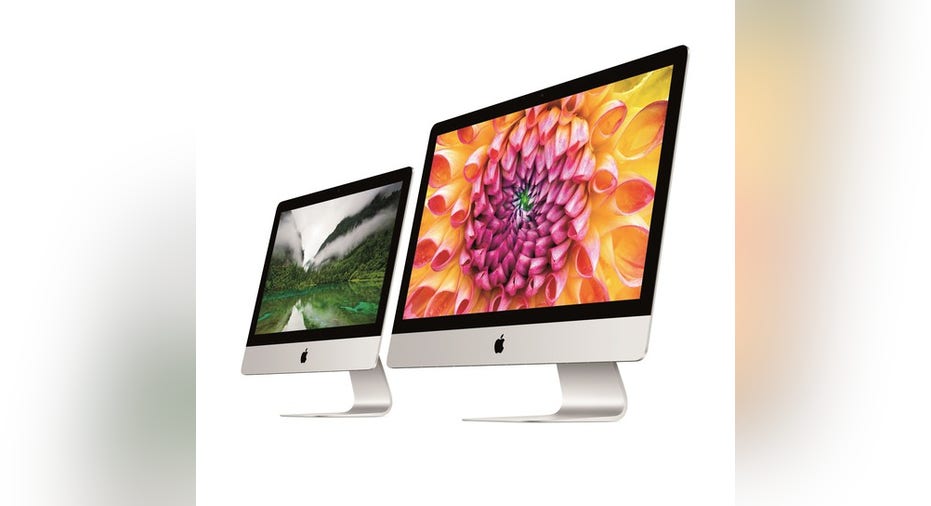Will Intel Corporation Finally Lose Its Place in Apple's Mac Products?

Image source: Apple.
Over the past several years, speculation has run rampant that Apple (NASDAQ: AAPL) intends to eventually replace chips from microprocessor giant Intel (NASDAQ: INTC) inside its Mac products with homegrown ARM Holdings-compatible microprocessors.
For a while, it seemed there was no immediate threat to Intel's Mac business, given the relatively large performance deltas between Intel's notebook processors and Apple's own A-series processors used in both the iPhone and the iPad.However, beginning with the A9 and A9X chips launched about a year ago and continuing on with the recently released A10 and the soon-to-be-launched A10X, it's clear that Apple's engineering teams are now able to deliver offerings that are truly competitive with Intel's low-power notebook processors.
In other words, the argument that Apple's chips aren't powerful enough no longer appears to hold water. In that context, it's worth reconsidering whether Apple will ultimately boot Intel from the Mac line of products
My bet is still: not anytime soon. Here's why.
Apple can't easily or cheaply replicate Intel's product breadth
Apple releases two high-performance processors each year or so -- one for the iPhone and a beefed-up version of that offering intended for the iPad. Last year, we got the A9 and A9X, and I expect that the A10X will follow the A10 that launched in September by approximately six months.
If Apple were to replace Intel inside the Mac, it would need to build many more chips for each of its Mac products. Indeed, it would need to build chips for the MacBook Pro, the MacBook Air, the plain MacBook, and the iMac lines.
Intel currently services the plain MacBook with its Y-series processors, the MacBook Air and 13-inch MacBook Pro with its U-series processors, the 15-inch MacBook Pro and 21.5-inc iMac with its H-series processors, and the 27-inch iMac with its S-series processors.
To be clear, all of the Intel processors that go into the Macs are based on the same fundamental building blocks -- CPU cores, graphics technologies, and the like -- but they are integrated in different quantities and proportions, such as CPU core count, graphics core count, and so on.
Apple could certainly invest in building additional configurations/variants for a suite of Mac chips, but given that the company ships roughly 20 million Macs a year, which is just a fraction of the number of iPhones and iPads that it ships, the potential return on that investment might not be good enough.
Focus, focus, focus!
One of the reasons Apple's chip teams are able to execute so beautifully is that the company has a lot of the world's best chip engineers all working on a very targeted set of products. They don't have their hands full trying to build different chip configurations or weighing painful trade-offs to make its core technologies scale across too wide of a range.
Each year, the company puts out arguably the world's best smartphone and tablet processors. Although Apple would still probably put out excellent chips for these segments with a broader focus, possible even including leadership products, somehow I think they would ultimately be less impressive.
Intel already invests billions to try to build a wide range of personal-computer processors, and these chips have successfully powered all of Apple's Macs for years. Unless Apple thinks Intel won't be able to build chips that enable it to offer the Mac experiences it aims to deliver to consumers -- and that's unlikely -- then it simply doesn't make sense for Apple to switch to an in-house solution anytime soon.
A secret billion-dollar stock opportunity The world's biggest tech company forgot to show you something, but a few Wall Street analysts and the Fool didn't miss a beat: There's a small company that's powering their brand-new gadgets and the coming revolution in technology. And we think its stock price has nearly unlimited room to run for early in-the-know investors! To be one of them, just click here.
Ashraf Eassa owns shares of Intel. The Motley Fool owns shares of and recommends Apple. The Motley Fool has the following options: long January 2018 $90 calls on Apple and short January 2018 $95 calls on Apple. The Motley Fool recommends Intel. Try any of our Foolish newsletter services free for 30 days. We Fools may not all hold the same opinions, but we all believe that considering a diverse range of insights makes us better investors. The Motley Fool has a disclosure policy.



















